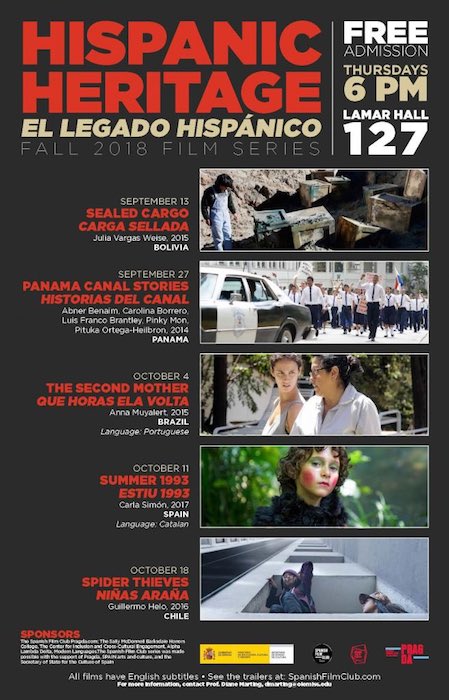Movies from Spanish- and Portuguese-speaking countries slated over coming month
SEPTEMBER 7, 2018 BY

The University of Mississippi Department of Modern Languages’ Hispanic Heritage Series films. The series is part of Hispanic Heritage Month, which runs Sept. 13-Oct. 15 at the university.
The University of Mississippi’s Department of Modern Languages will present five films from Spanish- and Portuguese-speaking countries as part of Hispanic Heritage Month, which runs until Oct. 15 at the university.
The first of five Hispanic Heritage Series films, “Sealed Cargo” a Bolivian black comedy on the topic of dumping toxic wastes in rural areas, kicks off the series at 6 p.m. Thursday (Sept. 13) in Lamar Hall, Room 127. All screenings are free and open to the public.
“Thanks to the dedication of our Spanish faculty, the Oxford and UM community will have another golden opportunity to explore and learn about Hispanic cultures,” said Daniel O’Sullivan, UM chair of modern languages. “Events like these showcase the dedication to cultural diversity from our department, the university and the surrounding community.”
The five films have English subtitles. All screenings are at 6 p.m. in Lamar Hall, Room 127:
- Sept. 13, “Sealed Cargo” – This Bolivian black comedy focuses on the normally unfunny topic of the dumping of toxic waste in rural areas. It features magnificent photography of the Andean region with haunting images of indigenous culture appearing at crucial moments.
- Sept. 27, “Panama Canal Stories” – This film comprises a series of shorts that follow chronologically sequential stories. The connections are finely attuned so they appear to tell a single story on the integration and lack of integration of the Panamanian and U.S. populations in the Canal Zone.
- Oct. 4, “The Second Mother” – The first Brazilian film to be featured in the series, “The Second Mother” focuses on the estranged daughter of a hard-working live-in housekeeper who suddenly appears, throwing into disarray the unspoken class barriers that exist within the home.
- Oct. 11, “Summer 1993” – Six-year-old Frida moves in with her aunt and uncle after her mother dies. The rich, saturated tones of this film belie the troubles Frida has in adjusting to her new life.
- Oct. 18, “Spider Thieves” – Several Chilean teenagers, including one who is pregnant, all of whom are from a poor section of town, decide it would be fun to see how the rich live. They break into upper-level apartments in skyscrapers from the outside. The film is based on a true story.
The Hispanic Heritage Series is made possible with the support of Pragda, the Spanish Film Club.com, SPAIN Arts and Culture, and the secretary of state for the culture of Spain. See the trailers at Pragda.com.
Major campus sponsors are the Department of Modern Languages, Sally McDonnell Barksdale Honors College, Center for Inclusion and Cross-Cultural Engagement, and Alpha Lambda Delta Honor Society.
Several campus units also helped with publicity for the series, including the UM departments of English, history, political science, and sociology and anthropology; the College of Liberal Arts and its cinema minor program; Croft Institute for International Studies; and the Sarah Isom Center for Women and Gender Studies, as well as the Oxford Film Festival.
This year’s series offers more diversity in both topics and languages, which was intentional, said Carmen Sánchez, instructor in modern languages and one of the event organizers.
Diane Marting, associate professor of modern languages and another of the organizers, noted the strength of the group of films.
“This year, the series has several hard-to-see and well-made films from unexpected countries,” Marting said. “As a bonus, we also showcase four female directors.”
The films do more than simply give viewers a chance to hear Spanish language, said Irene Kaufmann, UM lecturer in Spanish.
“Watching foreign movies not only gives us an opportunity to peek into far-away realities and to listen to foreign languages; it also exposes us to a wider range of film styles,” Kaufmann said.
For more information, contact Marting at dmarting@olemiss.edu.